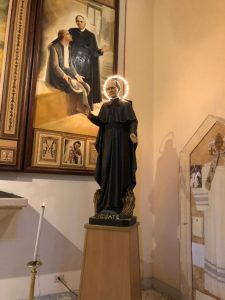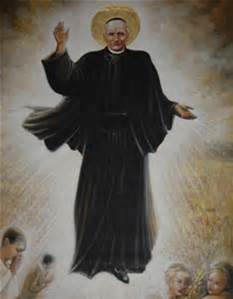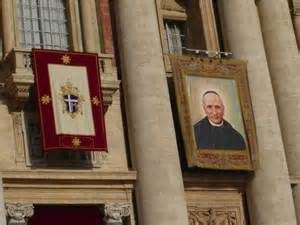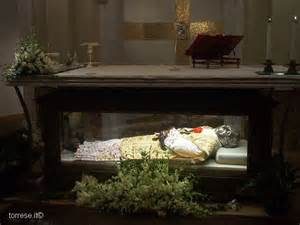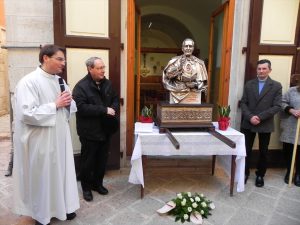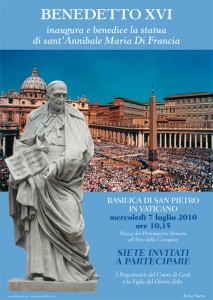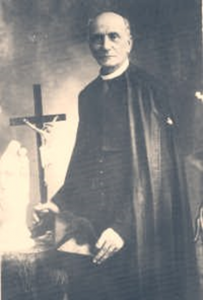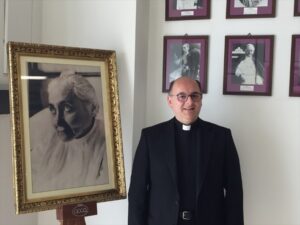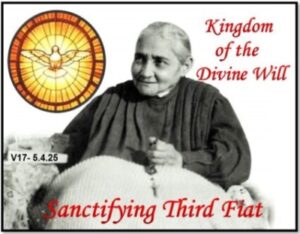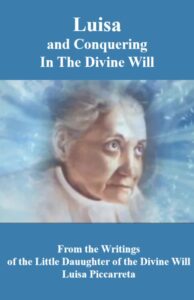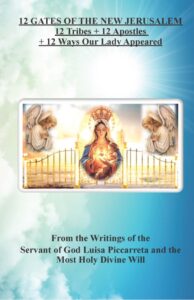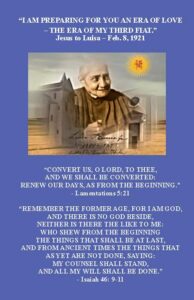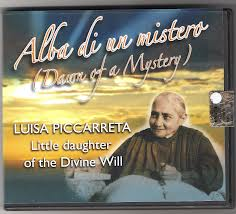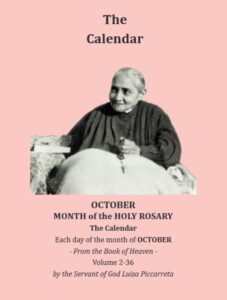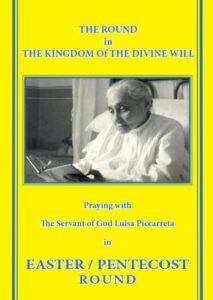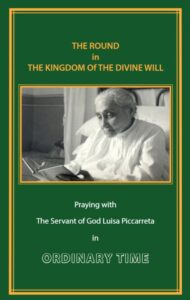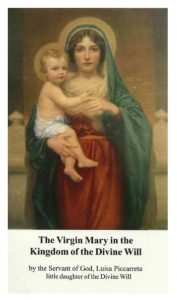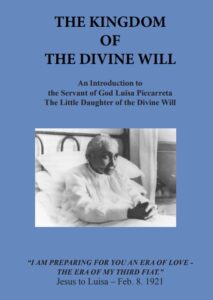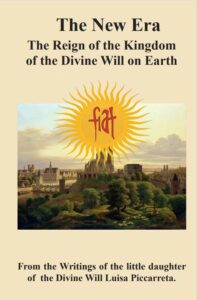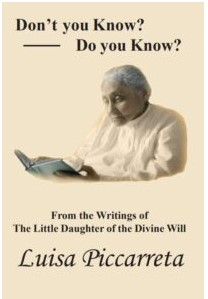St. Annibale Maria di Francia
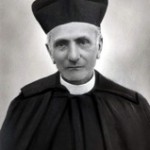 Spiritual Director of Servant of God Luisa Piccarreta
Spiritual Director of Servant of God Luisa Piccarreta
Saint Annibale Maria di Francia
Born July 5, 1851 in Messina, Sicily, Italy
He was ordained a Priest on March 16, 1878
He was Canonized by Pope St. John Paul II on May 16, 2004
Luisa: “I was feeling very afflicted, not only because of the privations of my Sweet Jesus, but also because I had received the unexpected news of the death of Reverend Father di Francia. He was the only one left to me, to whom I could open my poor soul. How well he could understand me – it was to a Saint that I would entrust myself, who had very much comprehended all the Value of what Jesus had Told me about the Divine Will. He had so much interest in it that, with insistence, he had taken all the writings with himself in order to publish them.” – V22 – 6.1.27
He entered Eternity on June 1, 1927
Since his youth, St. Annibale was drawn to prayer in order to obtain priests for the Church.
“Rogate ergo Dominum messis ut mittat
operarios in messem suam”
(Pray therefore the Lord of the harvest to send forth laborers into his harvest
Matt 9:38, Luke 10:2)
A supernatural Light Illuminated his being, the Lord was Calling him to propagate the Divine Command.
Among many achievements, he founded
The Rogationist Fathers of the Heart of Jesus
and the Daughters of Divine Zeal
(After learning of the following passage in Luisa’s writings, the Rogationists had this image painted. It is currently hanging in St. Anthony’s and St. Annibale’s Church, Rome, Italy)
Book of Heaven – Vol. 22 – June 1, 1927 – “I was feeling very afflicted, not only because of the privations of my sweet Jesus, but also because I had received the unexpected news of the death of Reverend Father di Francia. He was the only one left to me, to whom I could open my poor soul. How well he could understand me – it was to a saint that I would entrust myself, who had very much comprehended all the value of what Jesus had told me about the Divine Will. He had so much interest in it that, with insistence, he had taken all the writings with himself in order to publish them. So, I was thinking to myself: ‘After Jesus allowed that he would take the writings with himself, to my great sacrifice, because I did not want it, and only because he was a saint I had to surrender… And now, Jesus has taken him to Heaven.’ I felt I myself being tortured because of the pain, but – Fiat! Fiat! Fiat! everything ends down here. I poured out in tears, commending to Jesus that blessed soul (Rev di Francia), who had so much suffered and worked for Him; and while I was doing this, my sweet Jesus moved in my interior, and told me: “My daughter, courage, you must know that everything which that soul, so dear to Me, has done, all the Knowledges he has known about My Will, have caused him to enclose as much Light within his soul. So, each additional knowledge is a greater Light that he possesses, and each Knowledge places a distinct Light in the soul, one more beautiful than the other, together with the seed of the distinct happiness which each Light contains.
In fact, in anything good that the soul can know, with her will of putting it into practice within herself, she remains in possession of the good she knows. But if she does not have the will to put the knowledges she acquires into practice, it happens as when someone touches a flower or washes himself once with very fresh water: in that act, he will feel the fragrance of the flower, the refreshment of the fresh water, but since he does not possess the flower or the fount of fresh water, little by little the fragrance will vanish, as well as the good of the freshness of that water, and he will find himself empty of that fragrance, and without the freshness he had enjoyed. Such are the Knowledges when one has the good of knowing them but does not put them into practice. Now, that soul (Rev di Francia) had all the will to practice them; so much so, that in seeing the great good he felt, he wanted to make them known to others by publishing them. So, as long as he remained on earth, his body, more than wall, walled up that Light; but as soon as his soul went out of the prison of his body, he found himself Invested with the Light he possessed. And as the many seeds of happiness he possessed developed, which are the effects of the Knowledges about My Divine Will, he began to feel the beginning of the Life of True Beatitudes. And diving into the Eternal Light of his Creator, he found himself in the Celestial Fatherland, in which he will continue his mission about My Will, assisting everything himself, from Heaven.
If you knew the great difference in Glory, in Beauty, in Happiness, which exists between one who, upon dying, brings Light from the earth, together with the Seeds of many Happinesses, and one who only receives it from his Creator… There is such distance as to surpass the distance between Heaven and earth. O! if mortals knew the great good they acquire by knowing a True Good, a Truth, and by making it their own blood in order to absorb it in their own lives, they would compete among themselves, they would forget about everything in order to know one Truth – and would lay down their lives to put it into practice.”
While Jesus was saying this, I saw the blessed soul of father before me, near my bed, Invested with Light, Suspended from the earth, fixing on me, but without telling me one word. I too felt mute before him, and Jesus added: “Look at him, how Transformed he is. My Will is Light, and has Transformed that soul into Light; It is Beautiful, and has given him all the tints of Perfect Beauty; It is Holy, and he has been Sanctified. My Will Possesses All Sciences, and his soul has been Invested by Divine Science. There is nothing which My Will has not given to him. O! if all understood what Divine Will means, they would put everything aside, they would care about doing nothing else, and their whole commitment would be to do My Will alone.”
Fiat!
Canonization of St. Annibale Maria di Francia
May 16, 2004
by Pope Saint John Paul II
“Apostle of Prayer for Vocations and
the True Father of the poor”
On June 1, 1927, Saint Annibale died in Messina. As soon as the people heard the news of his death they began to say: “Let us go to see the sleeping saint”. A few days before the Blessed Virgin Mary had appeared to him and assured him of Her Protection, a vision to reward his tender devotion toward Her. His body is buried in the church of the “Evangelical Rogation” which Saint Hannibal himself had built in Messina. Many of his contemporaries, and among them St. Luigi Orione, requested that a formal Cause for Canonization be promptly started.
On February 4, 2018 – the parish of Santa Maria Greca and the Little Children of the Divine Will welcomed the relics of St. Annibale Maria Di Francia at Luisa Piccarreta’s house.
Saint Annibale Maria di Francia
Apostle of the Divine Will
“When I have completed everything, I will entrust My Kingdom to My ministers so that as second Apostles they will be Its heralds. Do you believe it is coincidental the visit of Fr. di Francia, who has shown so much interest in the publication of everything concerning My Will? No, no, I have arranged it; it is a Providential Act of the Supreme Will that wants him as first apostle and herald of the Divine Fiat. As founder of a work it is easier for him to approach bishops, priests and people, and also in his own institute, announce the Kingdom of My Will. For that reason I assist him so much and I give him Special Light, because to understand a Divine Will, Holy and Eternal, great Graces and not a small light but a Sun, are needed, as well as great disposition from the one to whom this office is conferred.” (Jesus to the Servant of God Luisa Piccarreta – Vol 20 – Nov 6, 1926)
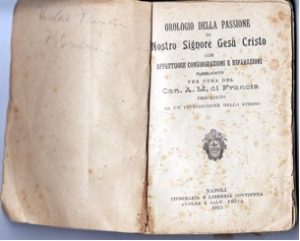 Many times he would go to Luisa’s house; as he was her extraordinary confessor. In his last years, the Archbishop of Trani appointed him director over everything referring to the publication of Luisa’s writings.
Many times he would go to Luisa’s house; as he was her extraordinary confessor. In his last years, the Archbishop of Trani appointed him director over everything referring to the publication of Luisa’s writings.
He was named ecclesiastical censor for the Archdiocese of Trani-Barletta-Bisceglie as well. He was also the first to begin publishing Luisa’s writings, the first of which was “The Hours of The Passion of Our Lord Jesus Christ,” which she wrote around the year 1913 or 1914. Saint Annibale made four editions of this book (1915, 1916, 1917 and 1921), all bearing the Nihil Obstat and Imprimatur. One of the best-remembered episodes, according to a number of witnesses, was the time that St. Father Annibale took the book, The Hours of the Passion, to the Holy Father, now St. Pius X (who received him privately on a number of occasions, as did Popes Benedict XV and Pius XI as well). While showing it to him, he was reading a few pages when the pope interrupted him, saying, “Not while standing, Father; this book should be read kneeling. It is Jesus Christ who is speaking.”
His Holiness Pope Benedict XVI blesses the 17.5’ statue
of St. Annibale Maria di Francia
at the Basilica of St. Peter in the Vatican, Rome
on July 7, 2010
“It seems that Our Lord, Who century after century increases the wonders of His Love more and more, wanted to make of this virgin (Luisa Piccarreta) with no education, whom He calls the littlest one that He found on earth, the instrument for a mission so sublime that no other can be compared to it – that is, the Triumph of the Divine Will upon the whole earth, in conformity with what is said in the Our Father: Fiat Voluntas Tua sicut in Coelo et in Terra.” – St. Annibale Maria di Francia
St. Annibale Maria di Francia
Feast day: June 1
Beatified By: 7 October 1990 by Pope John Paul II
Canonized By: 16 May 2004 by Pope John Paul II
Annibale Maria di Francia (born July 5, 1851 in Messina, Italy, died June 1, 1927) is a saint venerated by the Roman Catholic Church. His father Francis was a Knight of the Marquises of St. Catherine of Jonio, Papal Vice-Consul and Honorary Captain of the Navy. His mother, Anna Toscano, belonged to the noble family of the Marquises of Montanaro. He was, therefore, from noble lineage.
His Childhood Years
The third of four children, he lost his father when he was only fifteen months old. The sad experience of being an orphan would have profound on his life and will make him deeply empathetic towards orphans.
At the age of seven he enrolled in the College of St. Nicholas, run by the Cistercian Fathers. He was a devout child. Here under the guidance of his spiritual director, he was introduced to a devout life and he developed such love for the Eucharist that he was allowed to receive the Holy Host daily, something exceptional in those days.
As a Young Student
He was only seventeen, when as he was at prayer in front of the Blessed Sacrament solemnly exposed, he was given the “revelation of Rogate”, that is, he deeply felt that vocations in the Church only come through prayer. Later on he found in the Gospel the very words of Jesus commanding such prayer: “Beg the harvest master to send out laborers to gather his harvest”. (Mt 9:38; Lk 10:2). These words became the main source of inspiration for his life and the charism which led his apostolate.
On July 11, 1909 he wrote to Pope S. Pius X: “From my youth I have devoted myself to the words of the Gospel: Pray therefore the Lord of the Harvest…In my charitable institutions, orphans, poor, priests and nuns, all pray incessantly to the loving Hearts of Jesus and Mary, to the Patriarch St. Joseph and to the Apostles, that they may provide the Holy Church with numerous and chosen laborers for the harvest of souls”.
The essence of the intuition of his youth was that prayer for vocations (Rogate) was not considered as a mere exhortation given by the Lord, but an explicit order, a compelling request, an “infallible remedy”. We can say, then, that his “discovery” cannot be regarded as something transitory and superficial but as the core of his life, the charism which will bring forth a new providential movement in the Church.
Young Hannibal proved to be of high intelligence and had a poetic disposition. He looked to a brilliant and secure career as a writer and poet but when he felt the sudden call from God, he immediately responded and generously put himself and his talents at the service of God.
When, on December 8, 1869 he was given the clerical garb, he soon began putting his talents to work and became a well received preacher. People, especially the simple and those from the lower classes, loved to listen to him because of the clarity of his sermons. He will carry on this special ministry for his entire life as a means to evangelize the simple and the poor.
As a Priest of God and Servant of His People
Once his theological studies were completed he was ordained a priest on March 16, 1878. A few months before his ordination, when he was still Deacon, he met a poor blind beggar, Francesco Zancone, who “providentially” led him to discover a world unknown to him: “Le Case Avignone” (The Avignone squatters), in the outskirts of Messina. It was to be his new field of apostolate and the beginning of a long journey of love and sacrifices for the poor and the orphans. Together with the intuition of the “Rogate”, this spirit of charity would be the characteristic of his life.
Wanting to dedicate himself completely to the poorest of the city he sought and received the permission and the encouragement of his bishop, Mons. Joseph Guarino. He looked at them with the eyes of Jesus and saw them as “sheep without a shepherd”.
Great and many were the difficulties and obstacles he had to face in this work but his profound faith sustained him always. He considered his service to the poor and the outcasts as a service done to Jesus Himself. As he cared for the poor he was at the same time attentive to both taking care of their human and spiritual needs.
In 1882 he opened a home for abandoned orphans and placed them under the patronage of St. Anthony of Padua. Later on all his charitable institutions for poor children will be called “Anthonian Orphanages”.
It was his main concern that in his institutions the children he provided not only with food and prepared for a job, but more importantly that they would receive a solid moral and religious education. He used to say: “We should love children with tender and fatherly love. This is the secret of secrets to gain them to God”.
He decided to begin a new publication and gave it the heading of “God and Neighbour” with the intention of involving all Christians in his charitable ideals. Soon he was publishing hundred of thousands of copies which he sent to benefactors around the world.
It was his fervent desire to help all the orphans and the poor of the world. But how? He perceived that the “Rogate” was the answer to his query. “What are these few orphans we attend to, these few people we bring the good news to, compared to the millions who are lost and abandoned as sheep without a shepherd?…I looked for an answer and I found a complete one in the words of Jesus: “Beg the Harvest Master to send out laborers to gather His Harvest“. I concluded then that I had found the secret key to all good works and to the salvation of countless souls” .
As a Man of God and a Man for Others
Saint Hannibal strived to become himself a model of the “good laborer” spoken of in the Gospels, and to be a priest “according to the Heart of Jesus”. His charity knew no bounds, and it was directed toward all those in need, including priests facing difficulties and cloistered nuns who often are forgotten by benefactors.
People regarded him as a Saint even when he was still alive. Mons. Angelo Paino, Bishop of Messina, later gave this testimony about him: “He was considered a Saint by all people. By this I mean people from all walks of life, social status and religious convictions”.
His Return to the Father’s Home
The Villa Torneamento in Monza, school called Padre Annibale di Francia
On June 1, 1927, Saint Hannibal died in Messina. As soon as the people heard the news of his death they began to say: “Let us go to see the sleeping saint”. A few days before the Blessed Virgin Mary had appeared to him and assured him of Her Protection, a Vision to reward his tender devotion toward Her.
Newspapers of the entire region reported with pictures and articles of the funeral and burial. Crowds of thousands came to mourn his passing away. Local authorities quickly released the permit allowing that his body be buried in the church of the “Evangelical Rogation” which Saint Hannibal himself had wanted and built in Messina. It is the only church in the world dedicated to the Gospel’s passage: “Pray therefore the Lord of the Harvest”.
Many of his contemporaries, and among them the St. Luigi Orione, requested that a formal Cause for Canonization be promptly started. But World War II put a temporary stop to the undertaking.
On April 21, 1945, the information stage of the process for Canonization began with the “Diocesan Investigations”. All the writings of Saint Hannibal (62 volumes) were examined by a Special Committee of Theologians.
In 1979 the Congress of Cardinals voted to begin the formal Cause for Canonization which officially began in Messina on March 8, 1980 at the same time the ”Eccliastical” Tribunal set up a Committee of Historians.
On December 21, 1989 Pope John Paul II promulgated the Decree on the “Heroic Virtues of the Servant of God”.
To proceed with the Cause of Canonization, a Sign of God, a Miracle was needed. On June 30, 1990 the Medical Commission of the Congregation for the Causes of Saints unanimously agreed that the case of Gleida Danese – a young Brazilian girl who was doomed to die because of the rupture of the aorta but who suddenly recovered – had no possible medical explanation. Both the Commission of Theologians on July 14, 1990 and then the Congress of Cardinals and Bishops on July 27, 1990 unanimously agreed upon the miraculous recovery of the girl and found that it was to be attributed to the intercession of the Servant of God, Hannibal di Francia.
He was canonized on May 16, 2004, by Pope John Paul II.
Legacy
Today the religious families founded by Saint Hannibal are present in the five continents of the world. In the spirit of their Founder, they dedicate themselves to a variety of apostolates. They work in institutions for orphans and abandoned children, schools for deaf and blind, homes for aged and pregnant girls, educational institutions and vocational schools, missions and parishes, religious printing houses and vocation centers which promote the ideals of “Rogate”.
The message and the mission of Saint Hannibal is not only valued among those involved in vocation ministry and those who have at heart the formation of the clergy but also by all those who have come to understand the need of prayer for more vocations in the Church.
The need for such a prayer has been recently recognized by the Supreme Authority of the Church. Pope Paul VI on January 23, 1964 instituted the “World Day of Prayer for Vocations”. Since then, every year, the Popes remind the universal Church that still today salvation comes to us through the work of many and holy ministers of the Gospel and that to obtain them from God we must pray.
Rogate!
Fiat!

